Step by Step Easy How to Draw a Dogs Face
Whether you're a dog owner (like myself), you love dogs or you simply want to learn how to make a cute portrait of a dog, this article will for sure help you!
We'll begin by learning about the best way to simplify a dog's head structure so you'll be able to use this method to draw any kind of dog!
What You'll Learn in this Tutorial
- The structure of a dog's head
- How to use the structure of our dog's head for other breeds
- How to detail dog features
- How does dog fur works and how to shade it?
Materials Needed for this Guide
- A piece of paper
- A graphite pencil from the number HB to 4B
- A graphite pencil from the number 8B (a higher gradation if possible)
- A blending stump / q-tip / piece of towel paper
- An eraser (a Tombow mono zero too if possible)
- A ruler
Here are all the steps in one image:
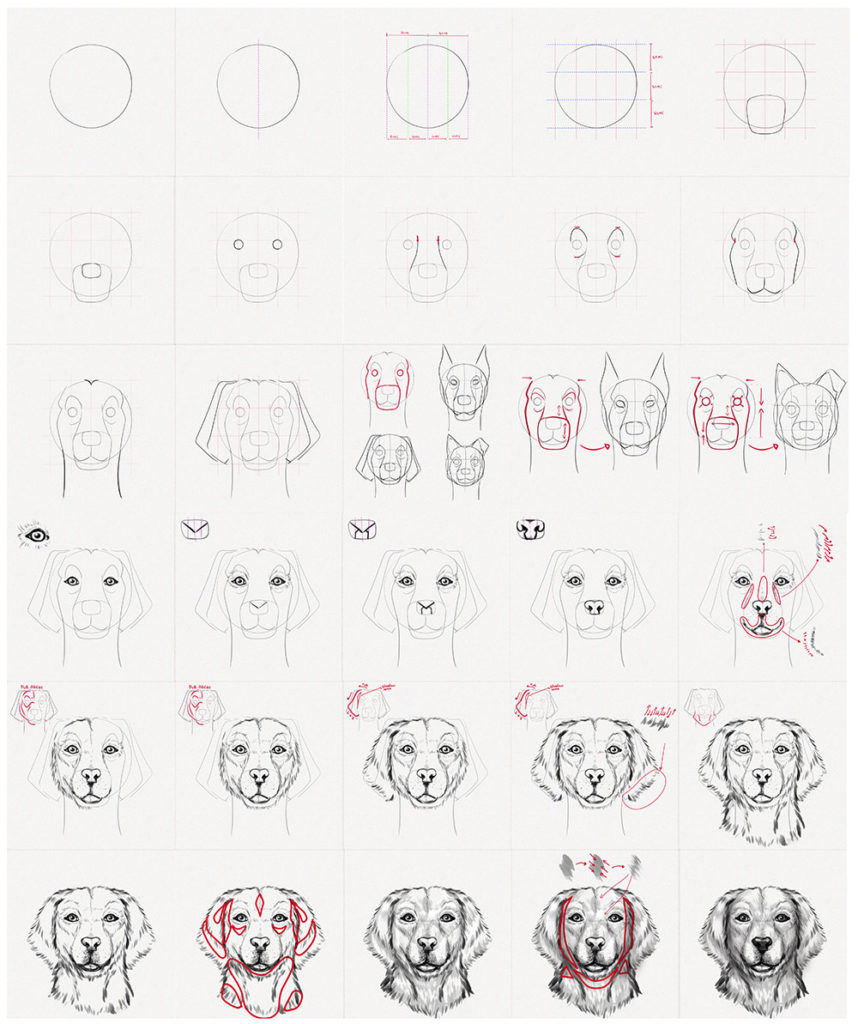
Let's begin!
Section 1: The Structure of a Dog's Head
For these steps, we're going to use a piece of paper (recommended Fabriano paper), a soft graphite pencil from the gradation HB to 4B, and an eraser.
Step 1: Draw a circle

Draw a circle in the middle of our canvas, This will be our dog's head (without ears) so make sure to make it as big as you want your dog's portrait to be.
Step 2: Find the middle of our circle
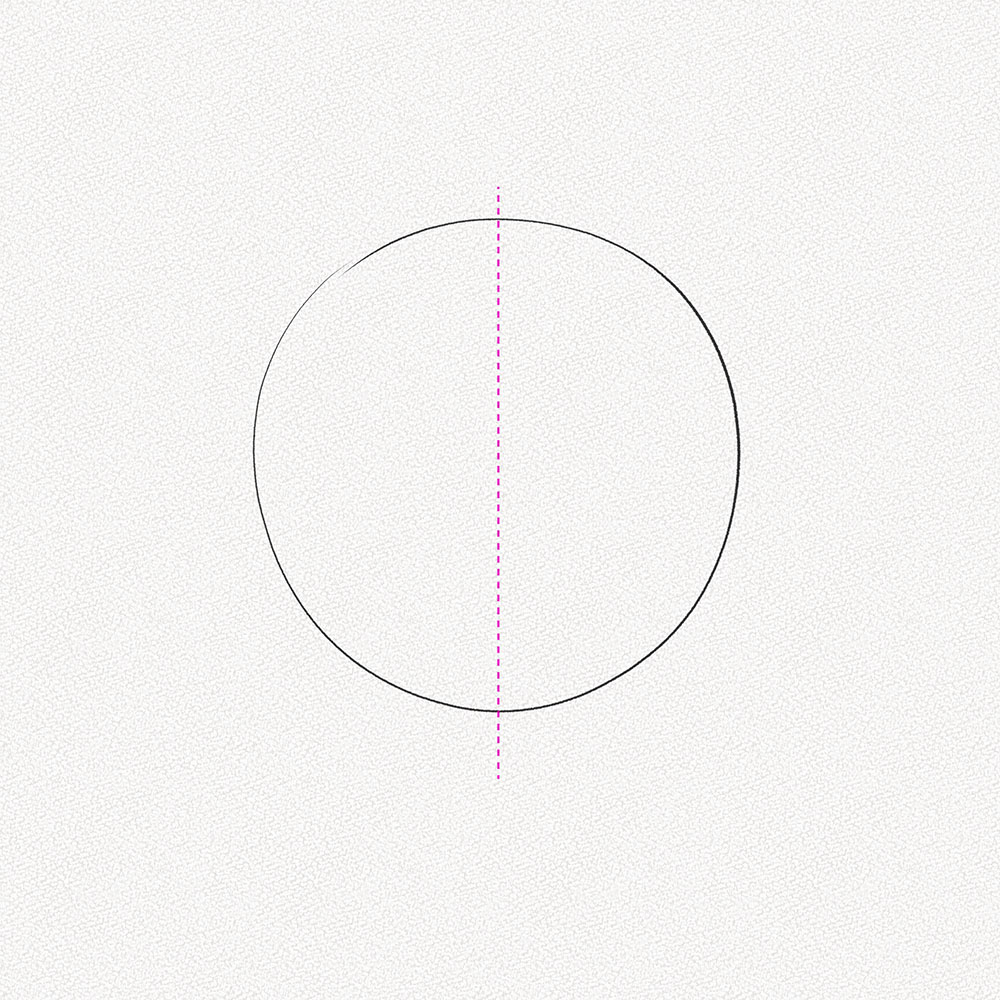
Find the middle point of our circle and draw a soft vertical line.
We're now going to establish a small grid that'll help us draw the structure of our dog's head accurately, make sure to pay attention to the following steps.
Step 3: Draw the vertical guidelines
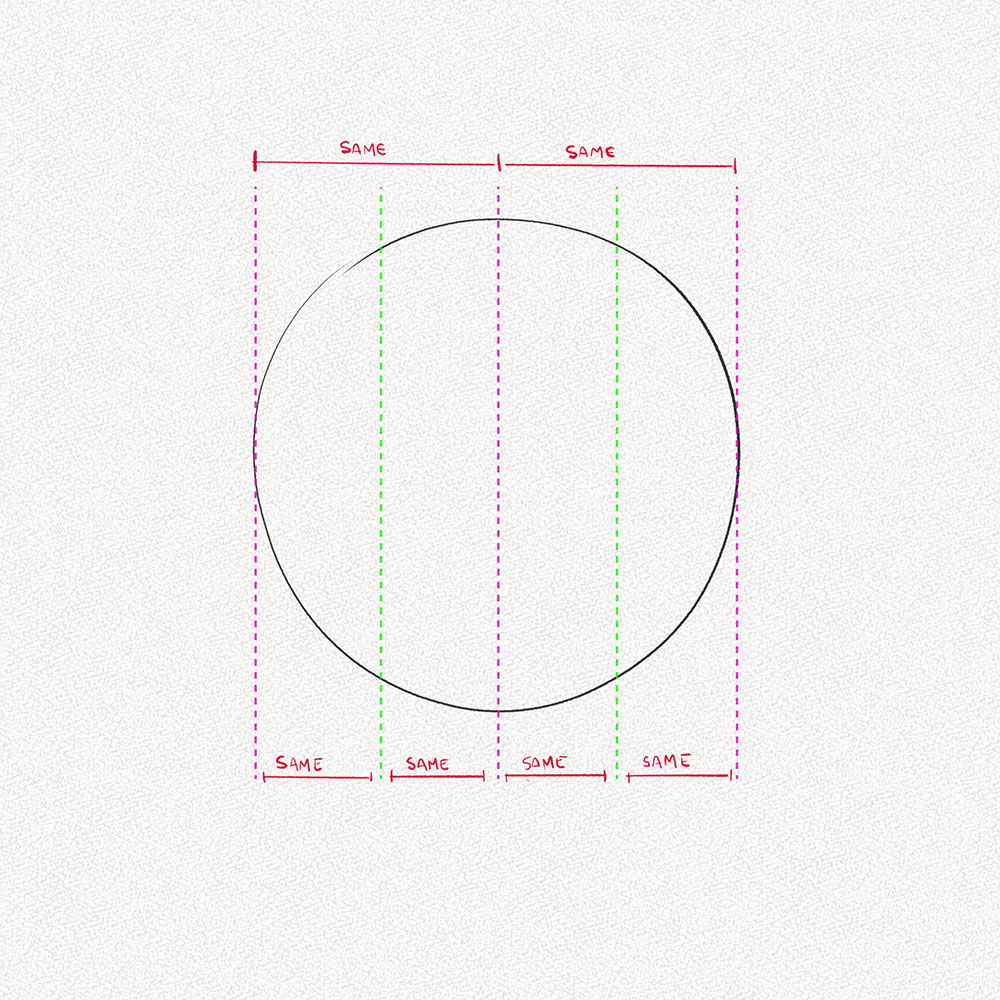
Find the middle point of each side of the circle and draw a soft vertical line on each side. Make sure the distance between each line and the borders of our circle are the same.
Step 4: Split our circle into three equal parts horizontally
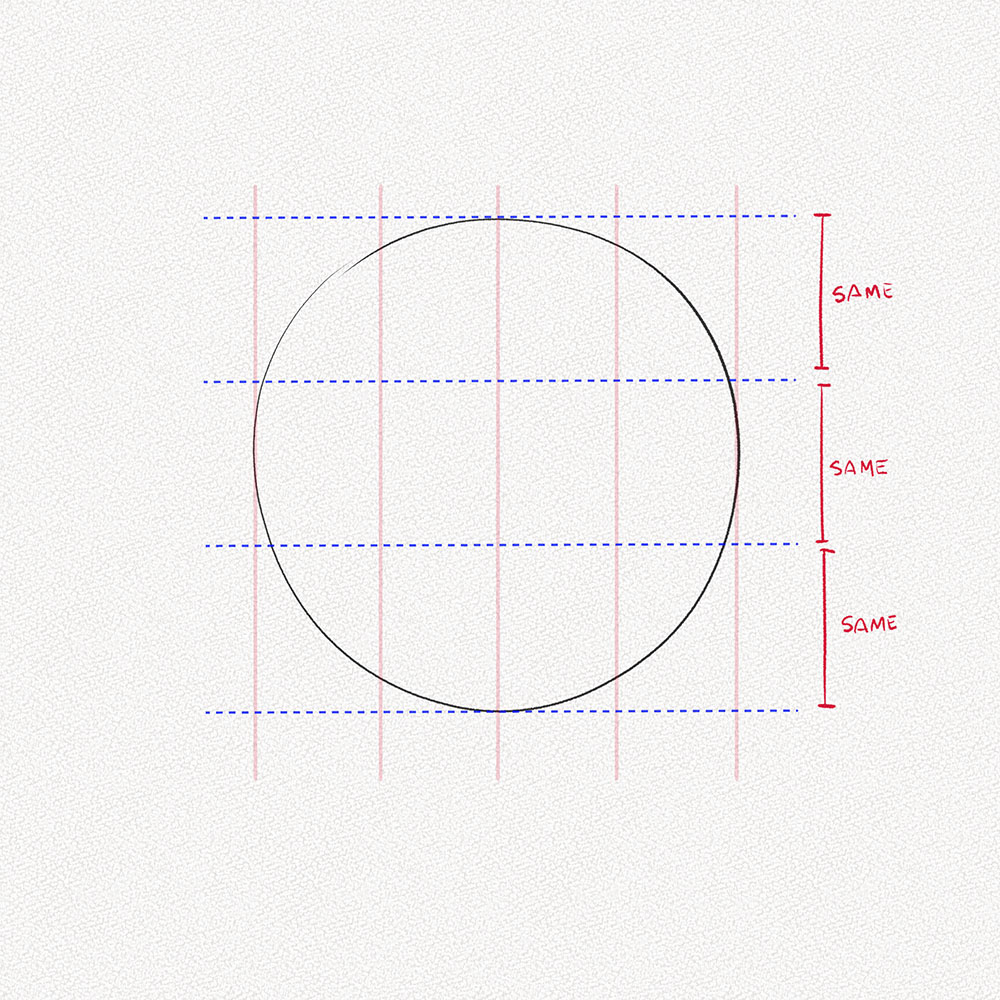
I promise this is the final step of our grid, cut the circle horizontally into three equal parts and trace soft lines.
Step 5: Draw a rectangle-like shape
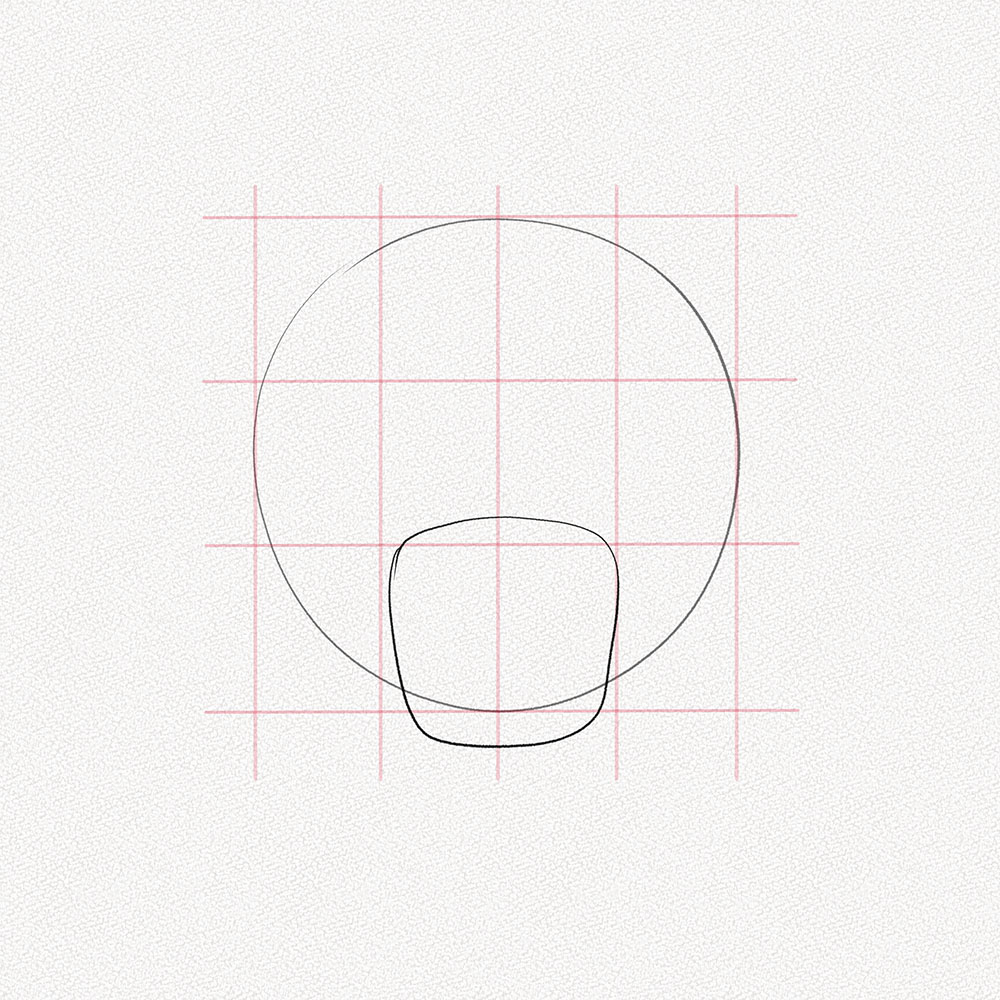
This shape will be the nose and mouth of our dog. Make it slightly bigger than the space between our first horizontal guidelines and slightly lower than the circle but make sure it fits between our vertical guidelines.
Step 6: Draw a smaller rectangular-like shape
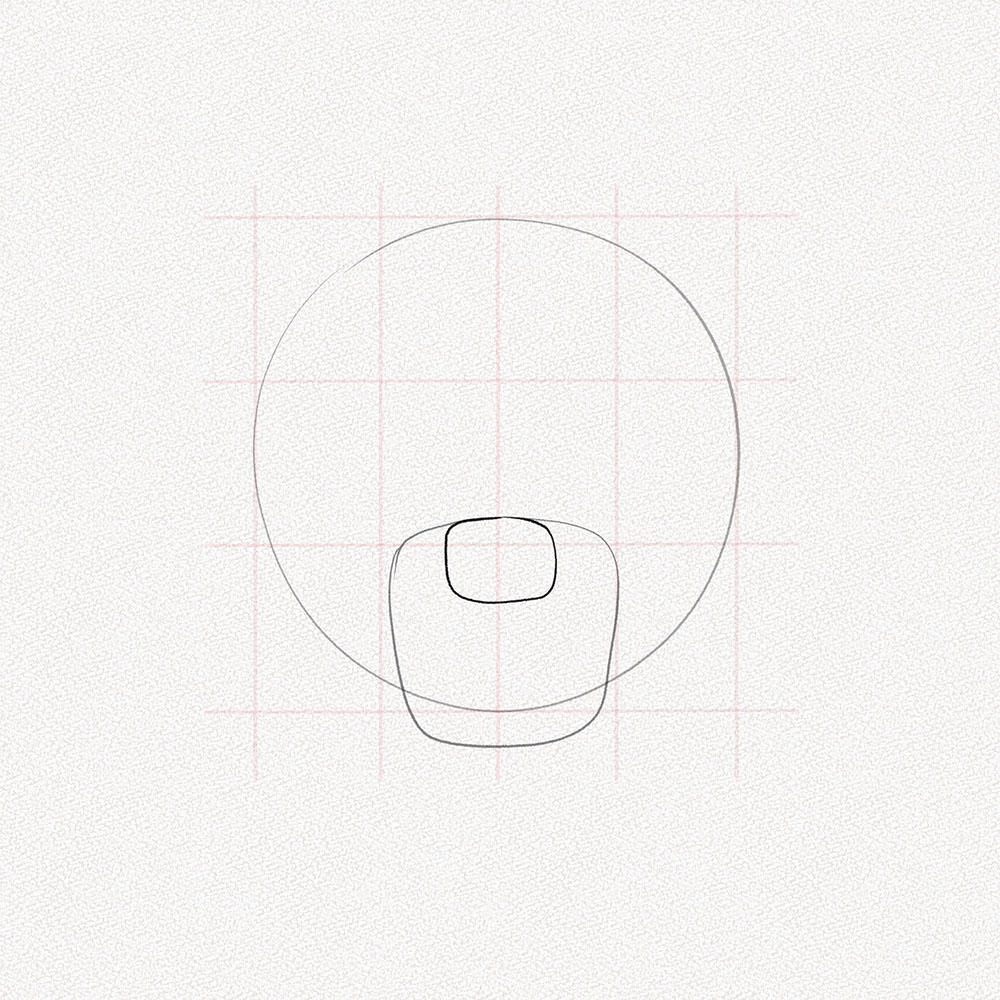
This shape will be the nose of our dog, make sure to make it symmetrical taking as reference the central guideline we drew in step 2.
Step 7: Set the position of the eyes
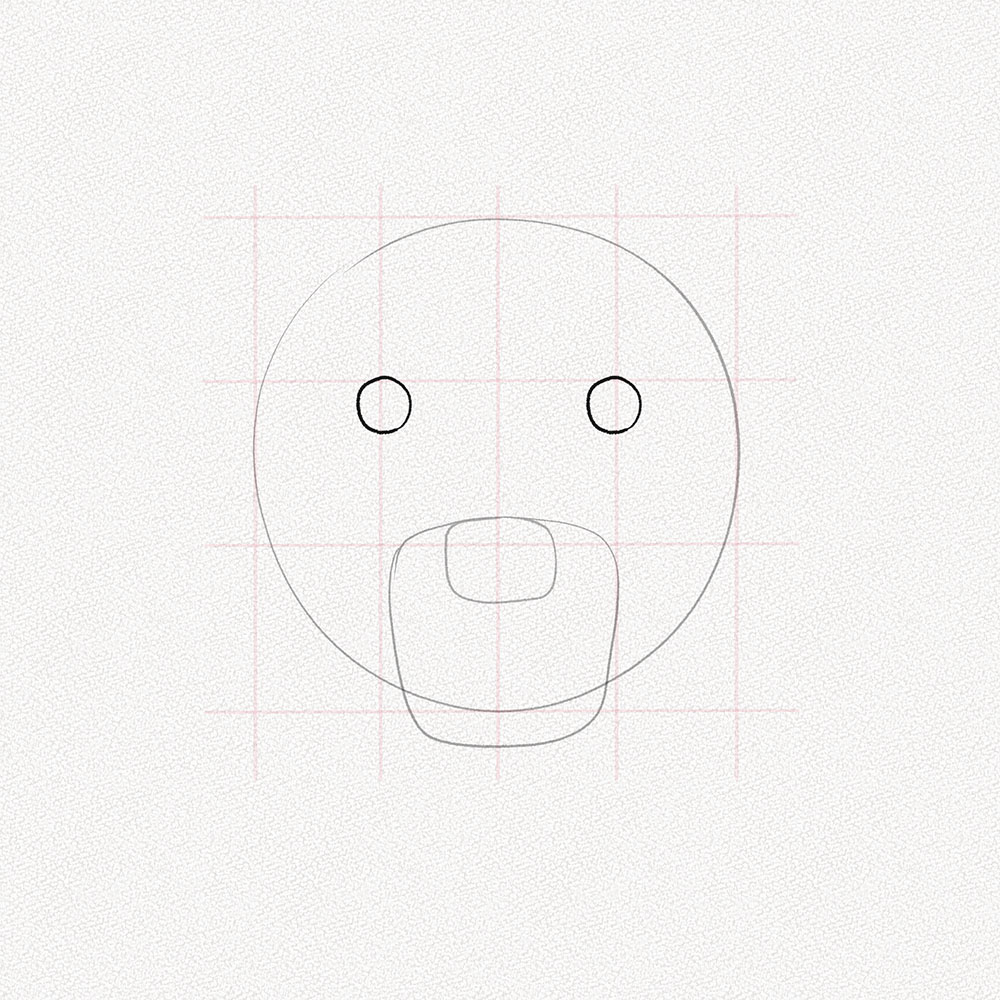
Draw two small circles in the position indicated in the example and make sure to align them with the middle of the vertical guidelines.
Step 8: Draw the nose bridge
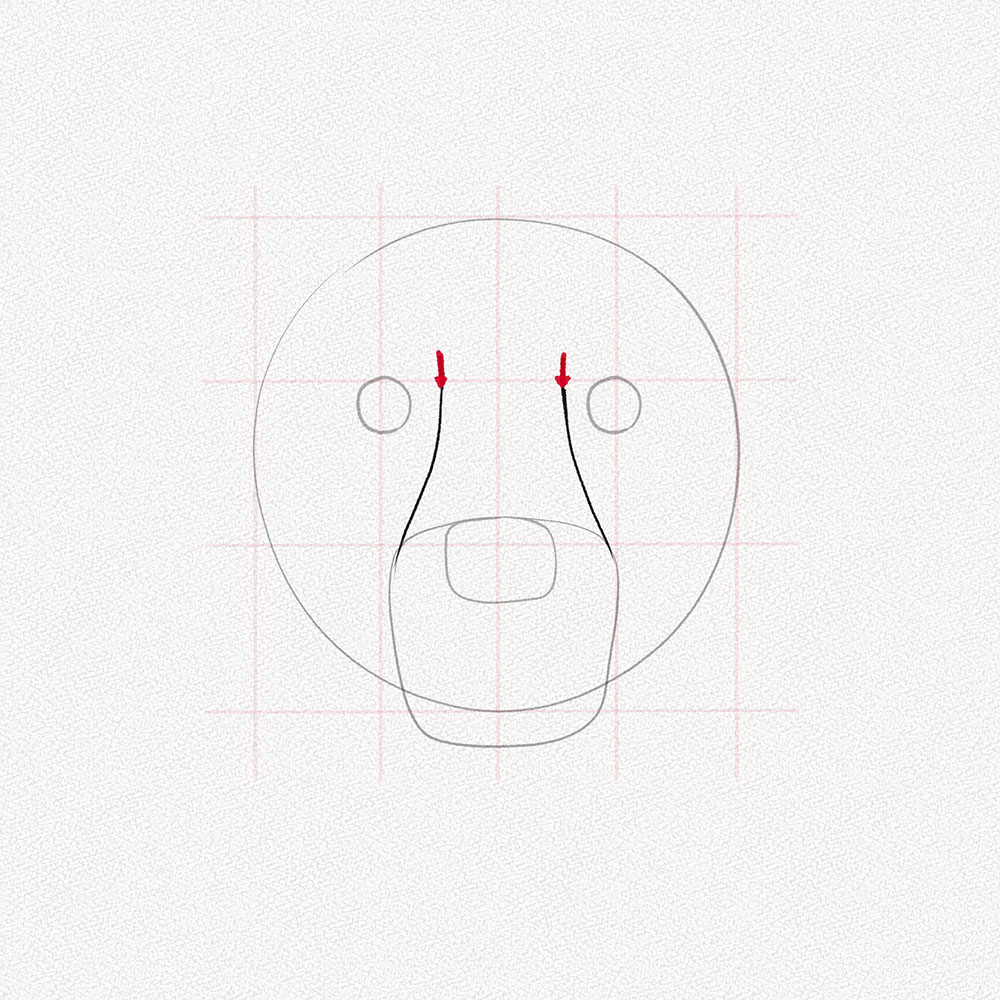
Pull two curved lines from the outer sides of the mouth to the inner side of the eyes, leaving a small gap between them.
Step 9: Draw the guides for the eyebrows and eyelids
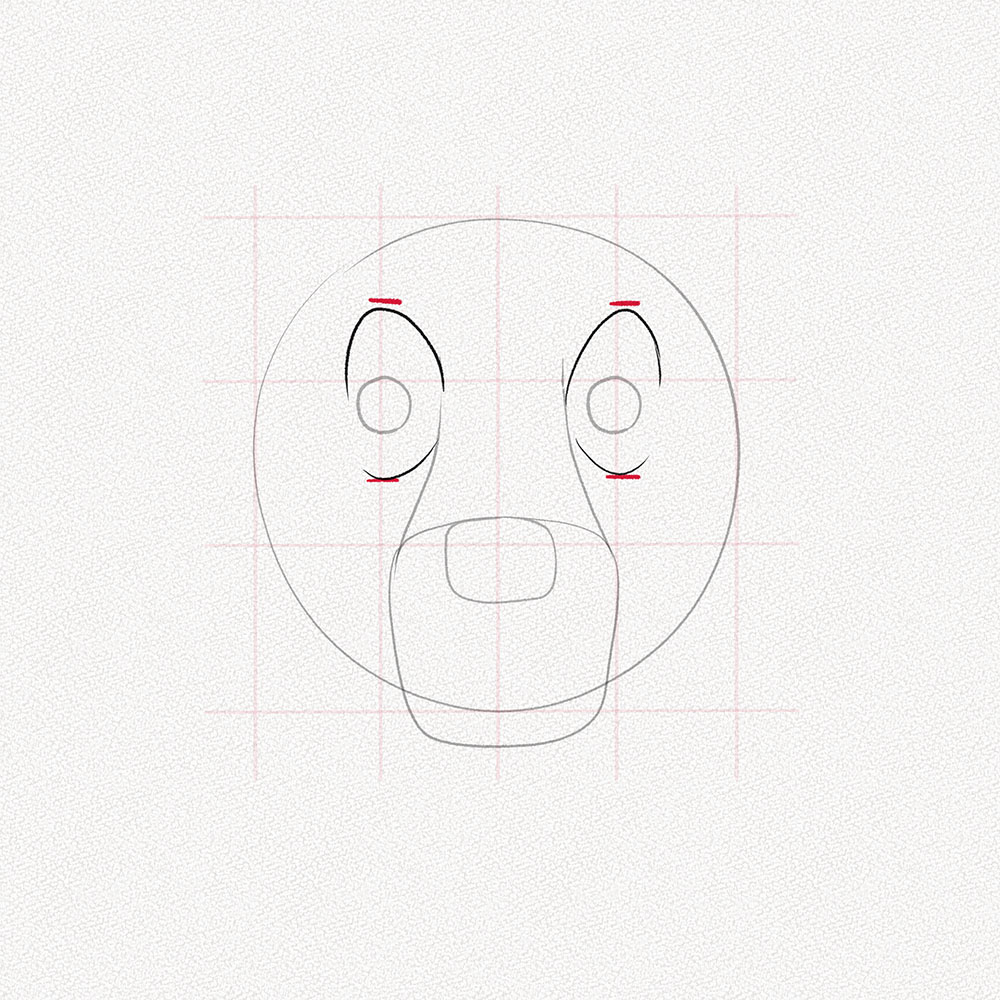
The simplest way to set the guides for our dog's eyeballs, eyebrows, and eyelids is to pull two curved lines from the nose bridge to half of the center guidelines, as shown in the example.
Step 10: Draw the face's structure
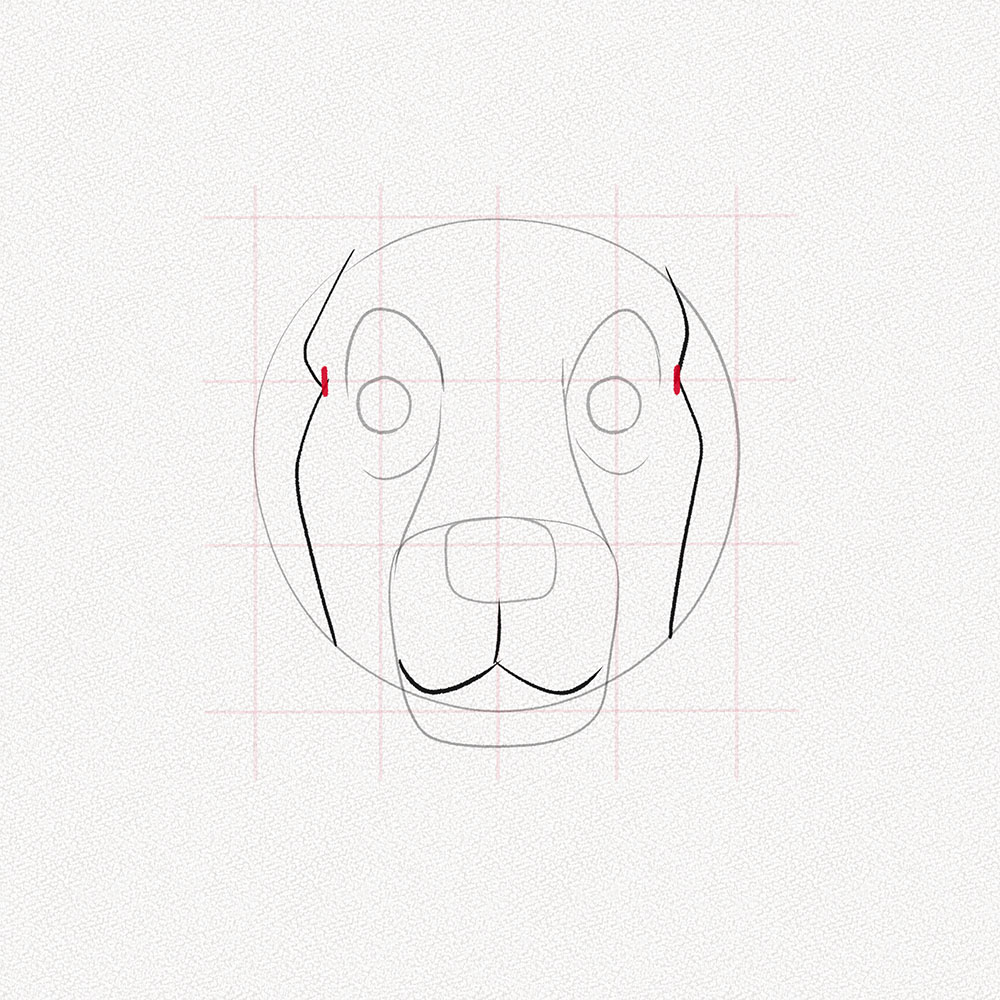
Dog's skulls are quite a bit difficult to simplify, but the best way to show structure in our dog's face is to set the guidelines as shown in the example. Draw two curved lines from half of our outer guidelines showing the temple and cheekbones of our dog.
Also, draw the mouth by making an inverse "Y" shape and pulling two curved lines from the extremes.
Step 11: Draw the neck and define the skull.
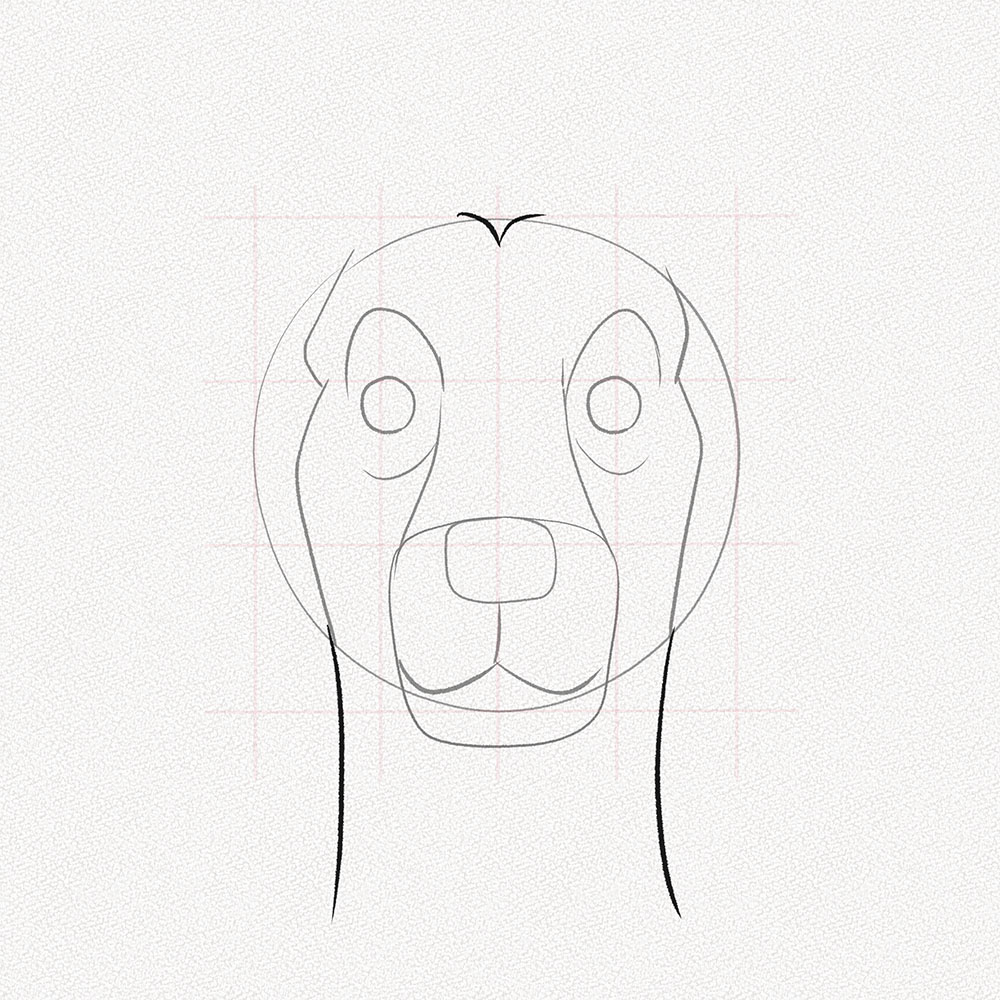
The dog's skull has an indentation that runs from the center to the bridge of the nose, we will represent this shape with two converging curved lines in the middle of the top of the head, and we'll also draw the neck, pulling down two slight curves from the cheek lines we drew in step 10.
Section 2 – Choosing a Dog Breed
Step 12: Different Kind of dogs
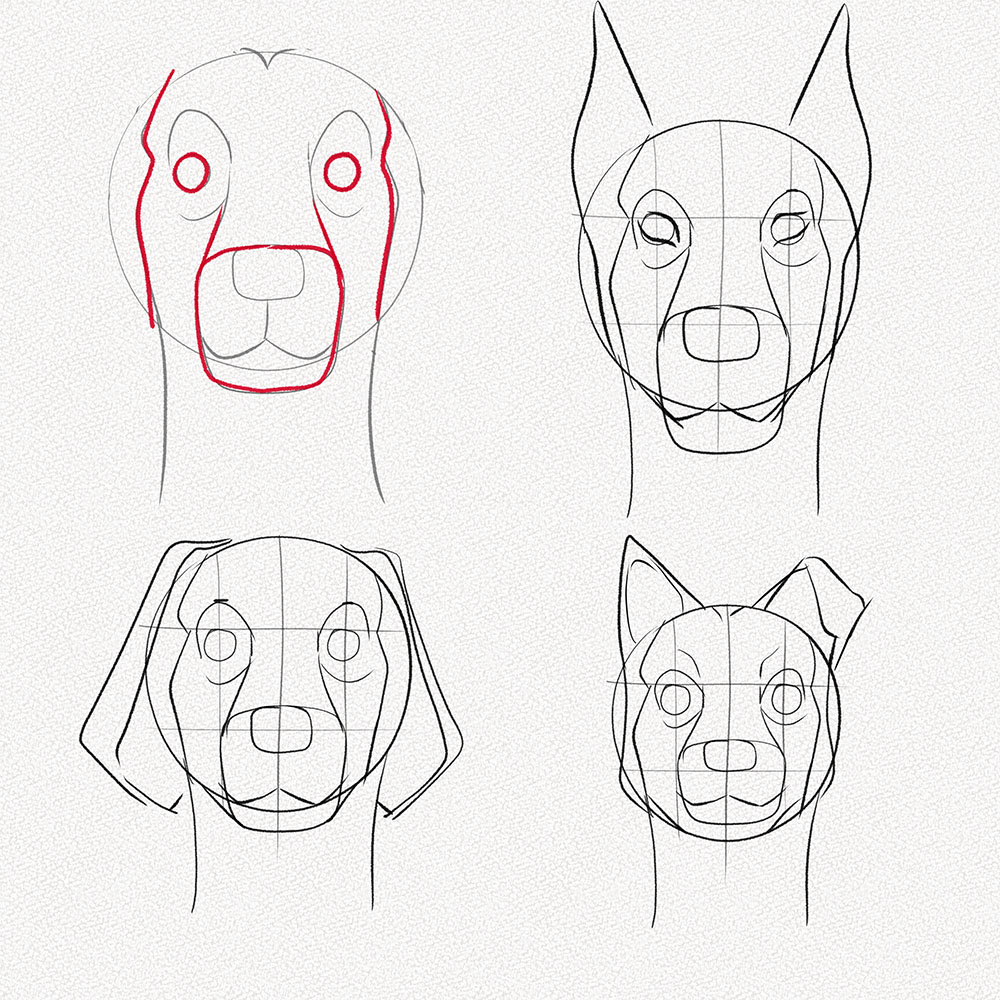
Every dog is different, the one that will be drawing in this tutorial is a cute golden retriever however, this dog face structure is good for any kind of dog! the only thing you'll have to do is move around the highlighted shapes. Keep reading to find out how!
Step 13: Large Dogs
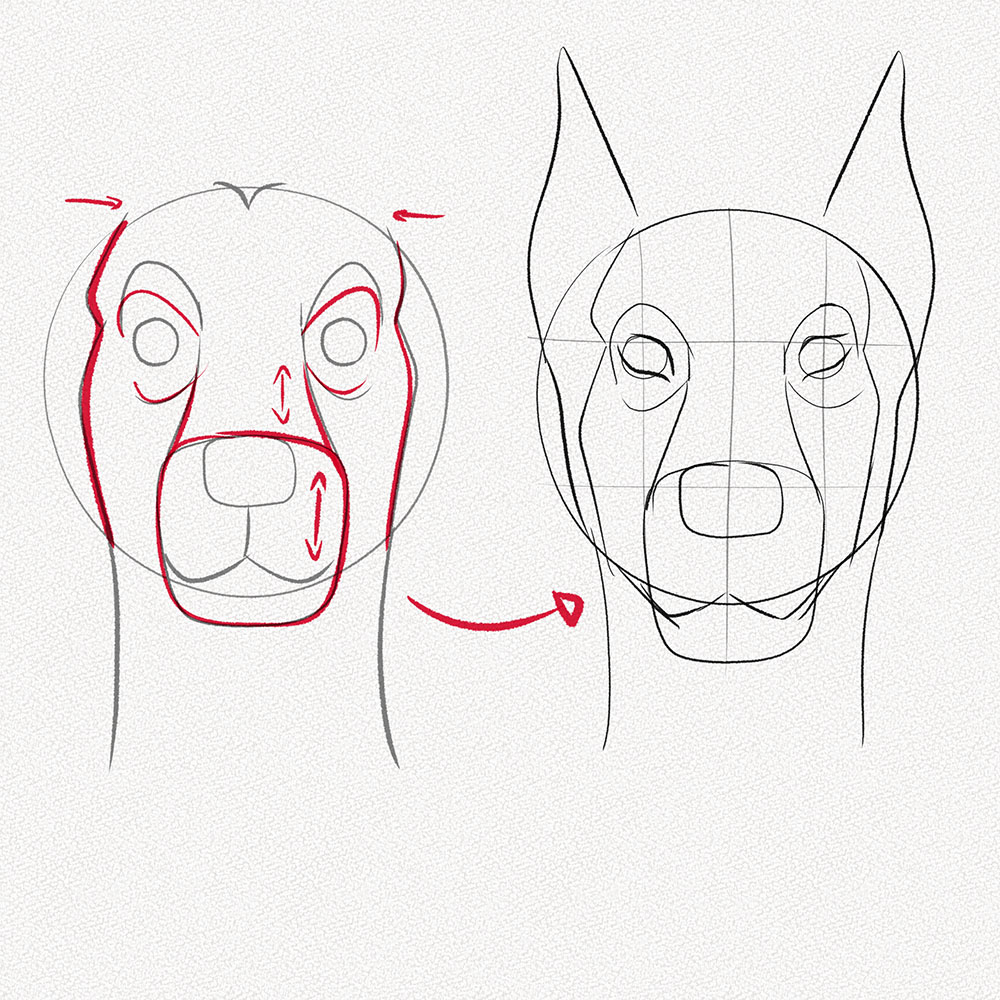
to draw a big dog like a Doberman, with sharp features and pointy ears all we'd have to do is elongate the nose bridge and the mouth shape and shorten the eye features while shortening the space between the structure face lines, draw the very pointy ears and we're done!
Step 14: Smaller dogs
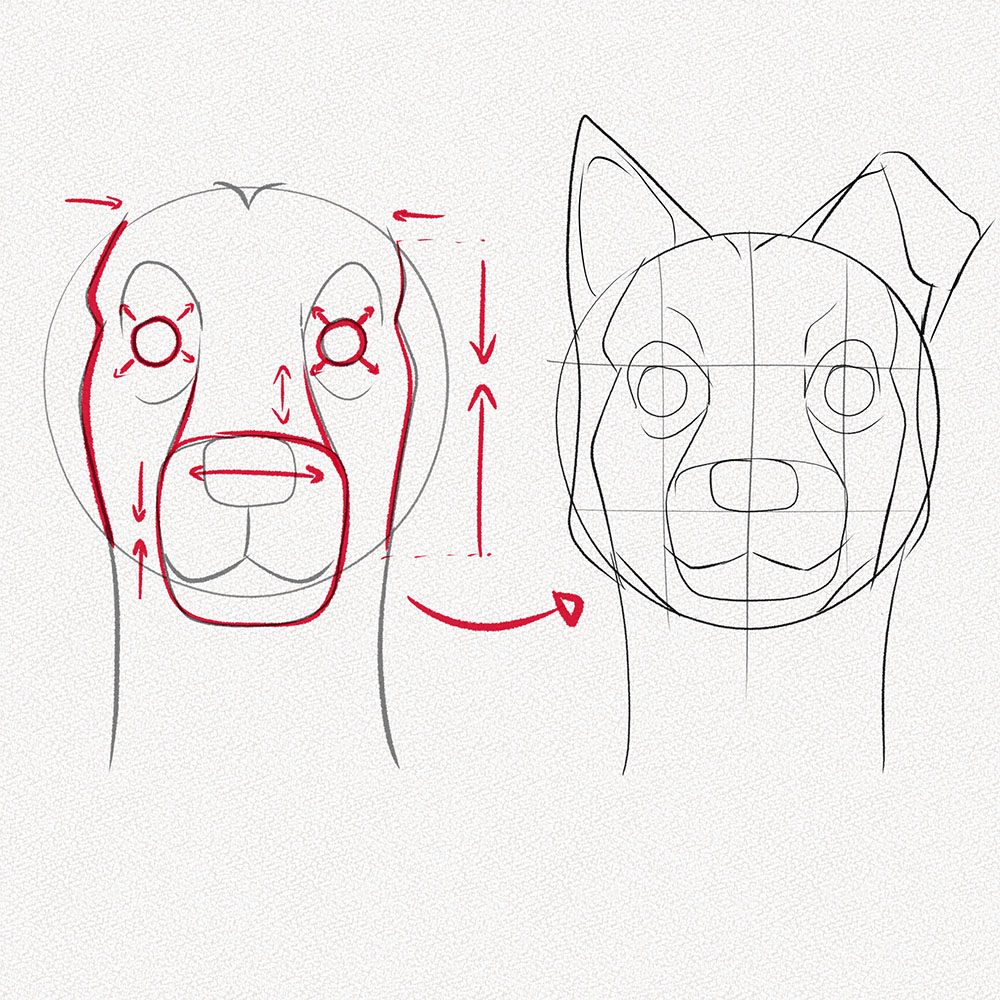
To draw a smaller breed, all we have to do is pay attention to their faces and adjust the shapes as we see fit. For this example, I enlarged the eyes, shortened the face structure lines, widened the nose bridge and mouth, and drew their basic ear shape.
Step 15: The Dog We'll Draw – A Golden Retriever
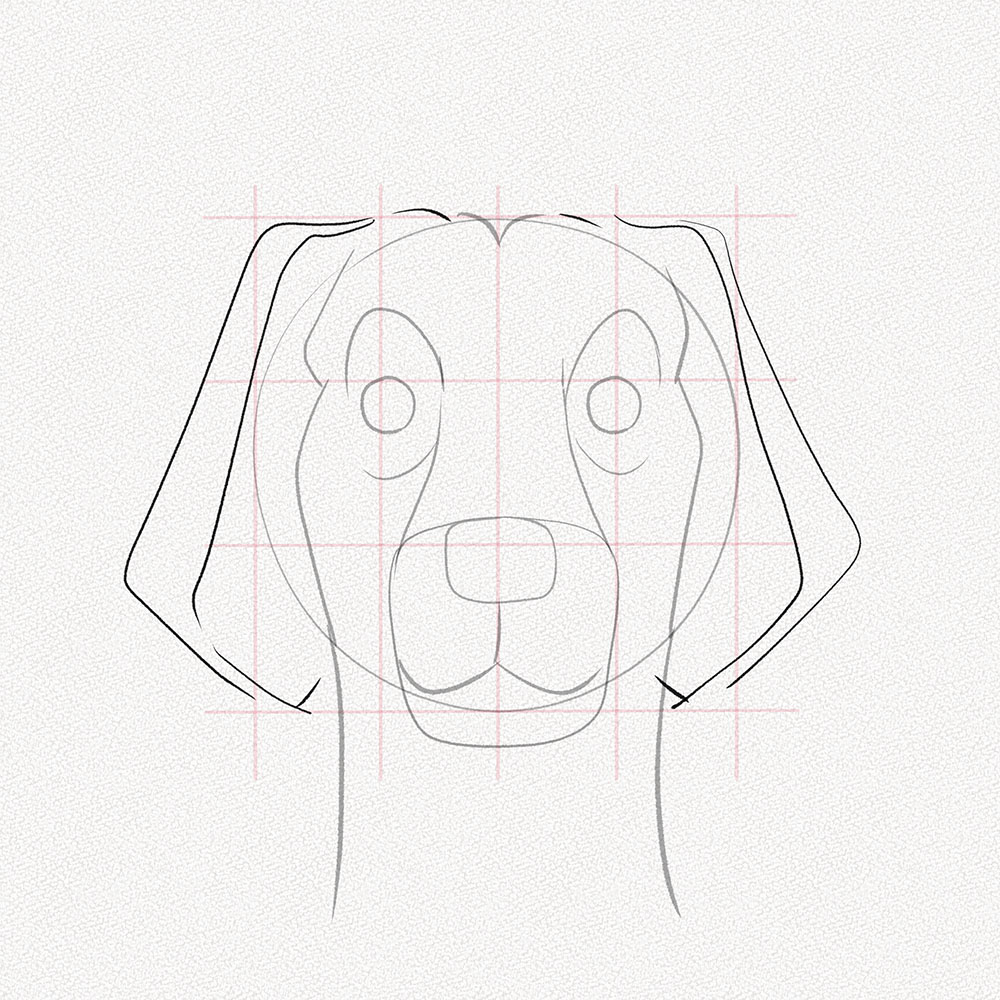
For this tutorial, we are going to draw a golden retriever, not changing the face structure much, we'll add the characteristic ear shape of these beautiful dogs and erase our guidelines so we can go ahead and start drawing!
Section 3: How to detail Dog's features
For these steps, we're going to use the 8B graphite pencil or graphite bar.
Step 16: The Dog's Eyes
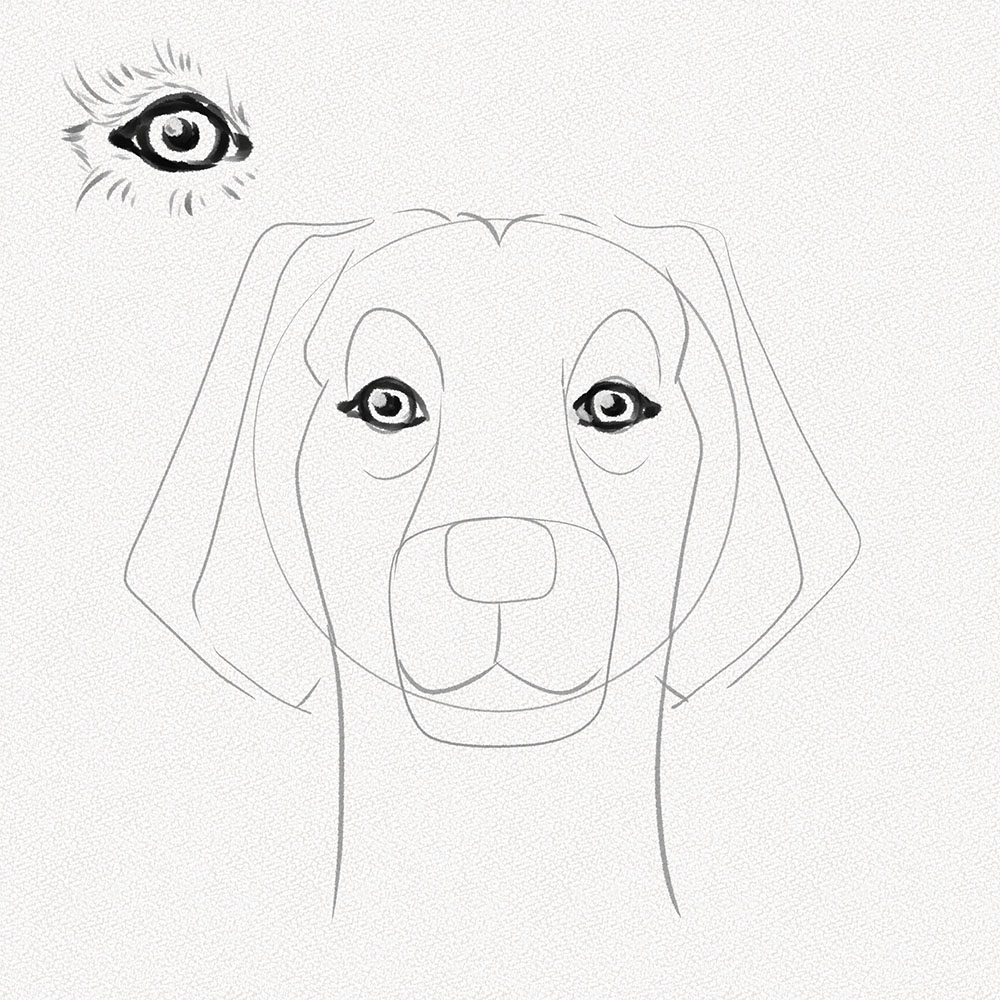
Paying close attention to our dog's breed (golden retriever) we're going to make the eyes. Make sure to add some fur on top of it to demark the eye's structure as well as the eyelids.
Need to learn how to draw eyes? Check out our extremely detailed step-by-step tutorial on How to Draw Eyes.
Step 17: Start Setting the Nose Structure
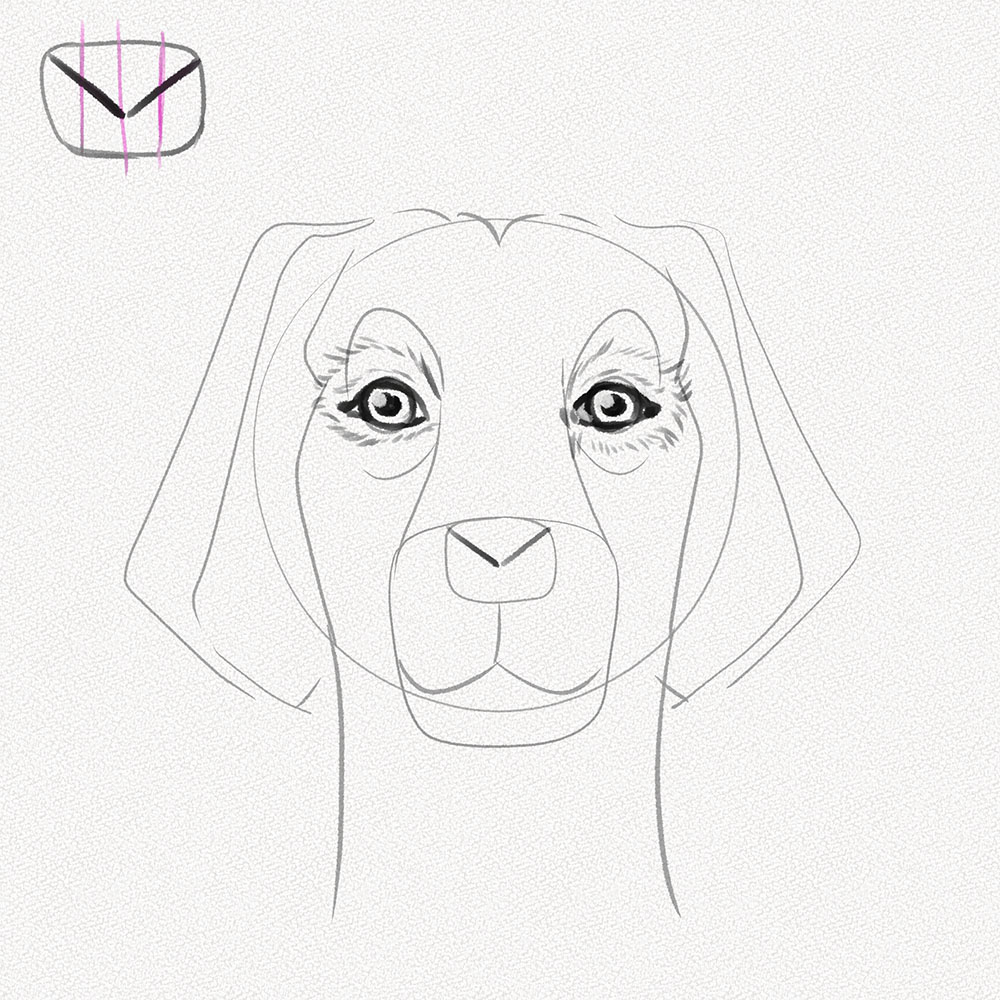
Dog noses are a bit complicated, but with these tips, you should be able to make it right! Section the dog's nose shape in three equal parts and draw a "V" form as shown.
Step 18: Complete the nose structure
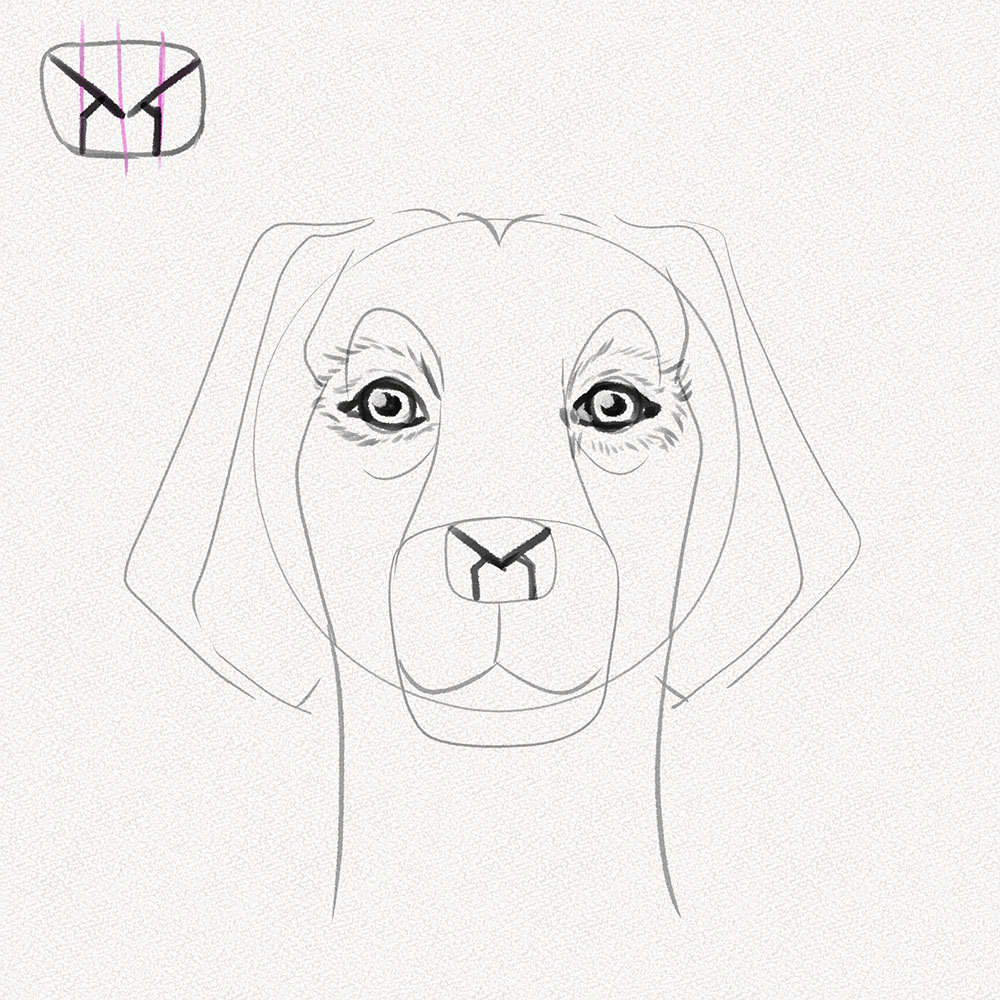
From the sides of that "V" shape, pull two short lines to our section guidelines and then another two vertical lines as shown.
Step 19: Draw half of the nose
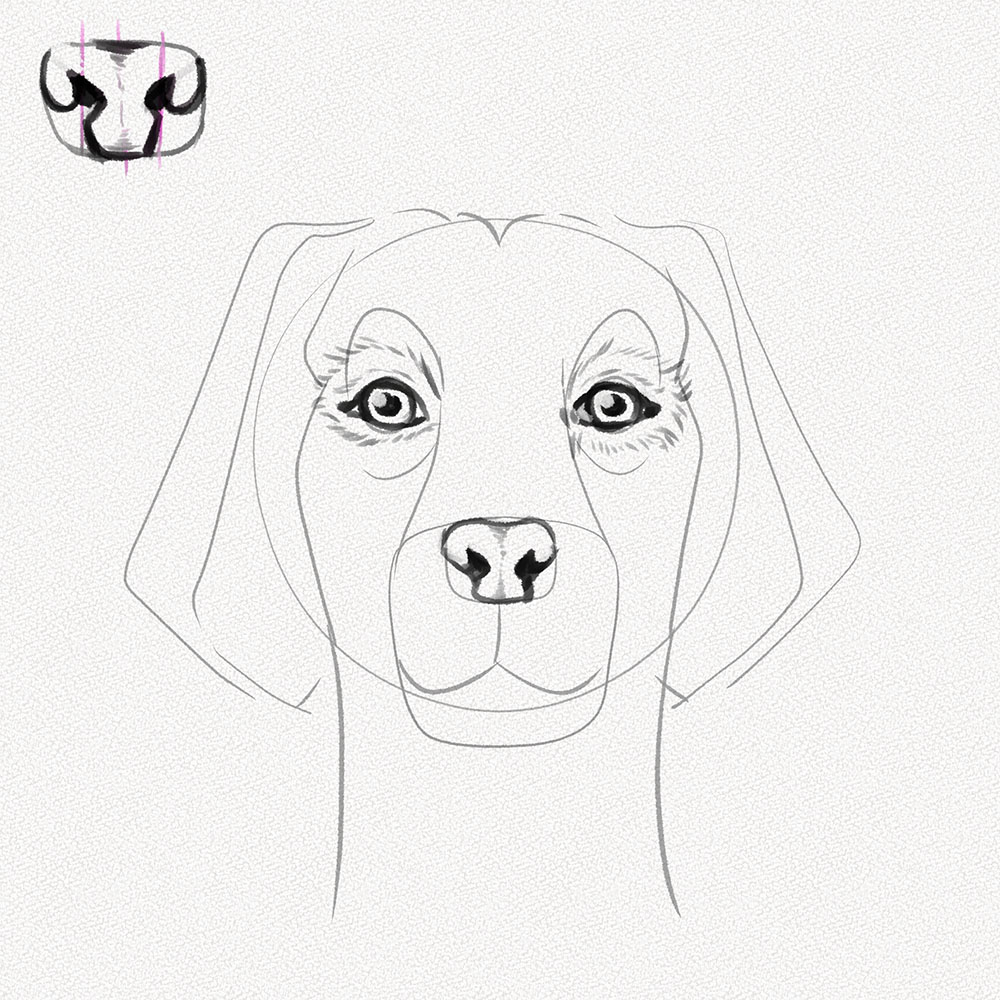
Now it's time to detail using the short like we drew as a guideline, we're going to draw two "water drop" like shapes and paint them all black, from the sides of those, pull two small curves to connect them to the top of our nose and paint the center line softly
Step 20: Add fur details to the face
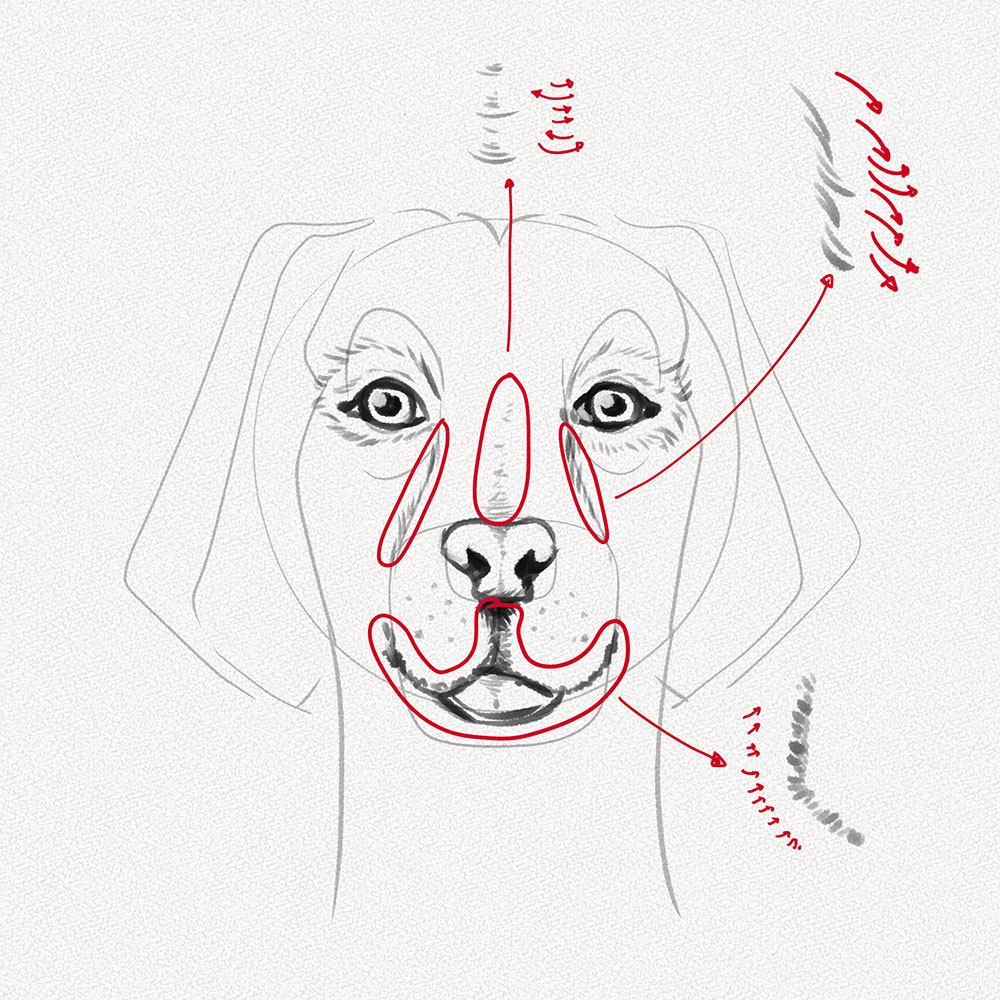
Following the instructions below, add some fur details to the nose bridge, center of the face, and mouth, with soft traces going in the directions pointed by the arrows in red as shown.
Section 4: Drawing and Shading Dog Fur
For these steps we're going to use or 8B graphite pencil and our blending stump / q-tip / piece of towel paper.
Step 21: Draw more fur to half of the face
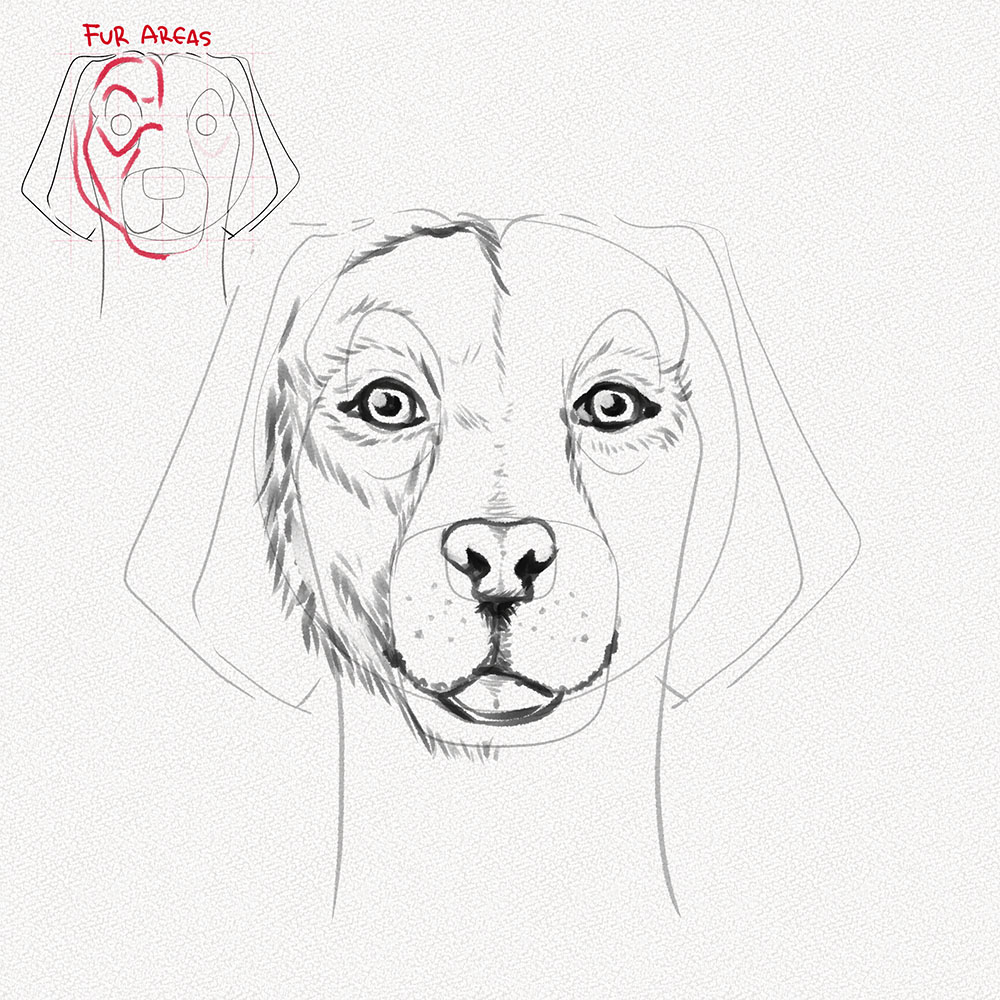
To learn how to place the dog's facial fur, we're going to do half of it first, going on top of the red areas shown in the mini diagram. With middle length, soft traces go over the border of the face and the lines marked in red.
Step 22: Do the other half.
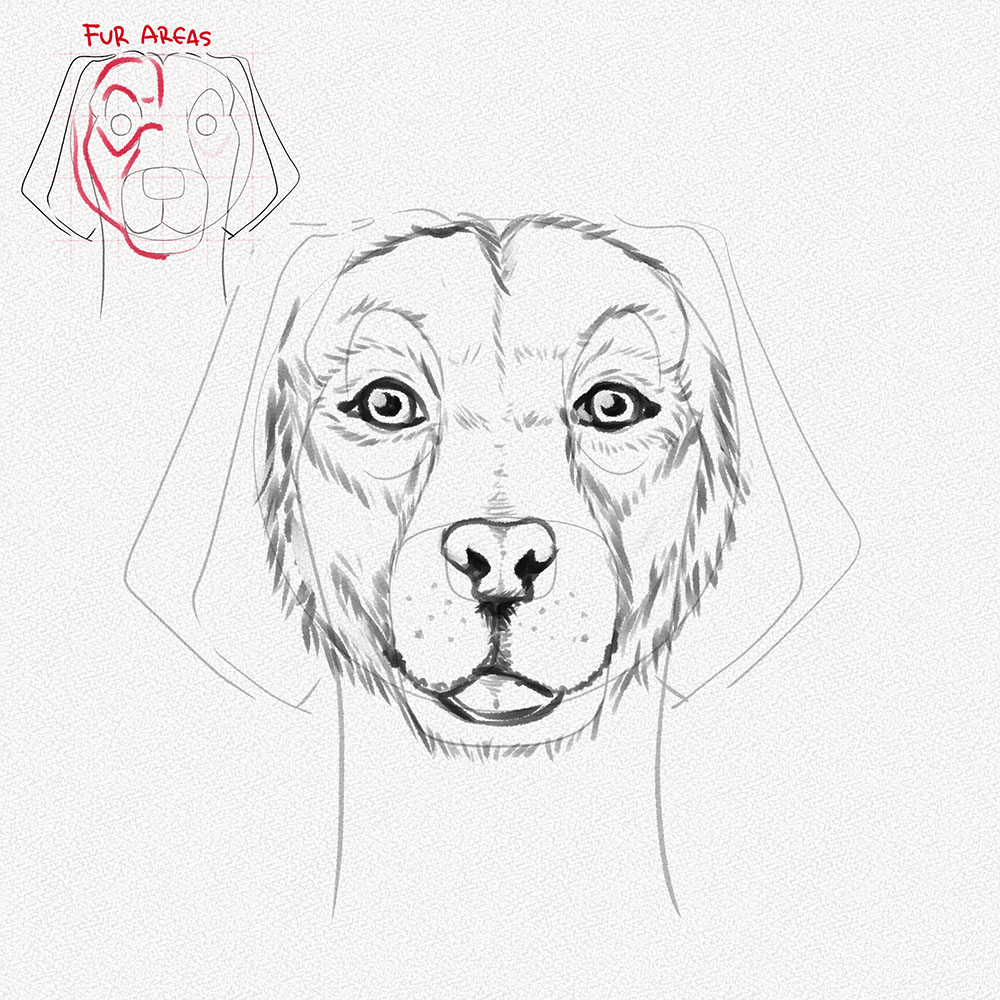
Do the same in the other half of the dog's face and we'll have set the base for our dog's face.
Step 23: The Dog's Ears
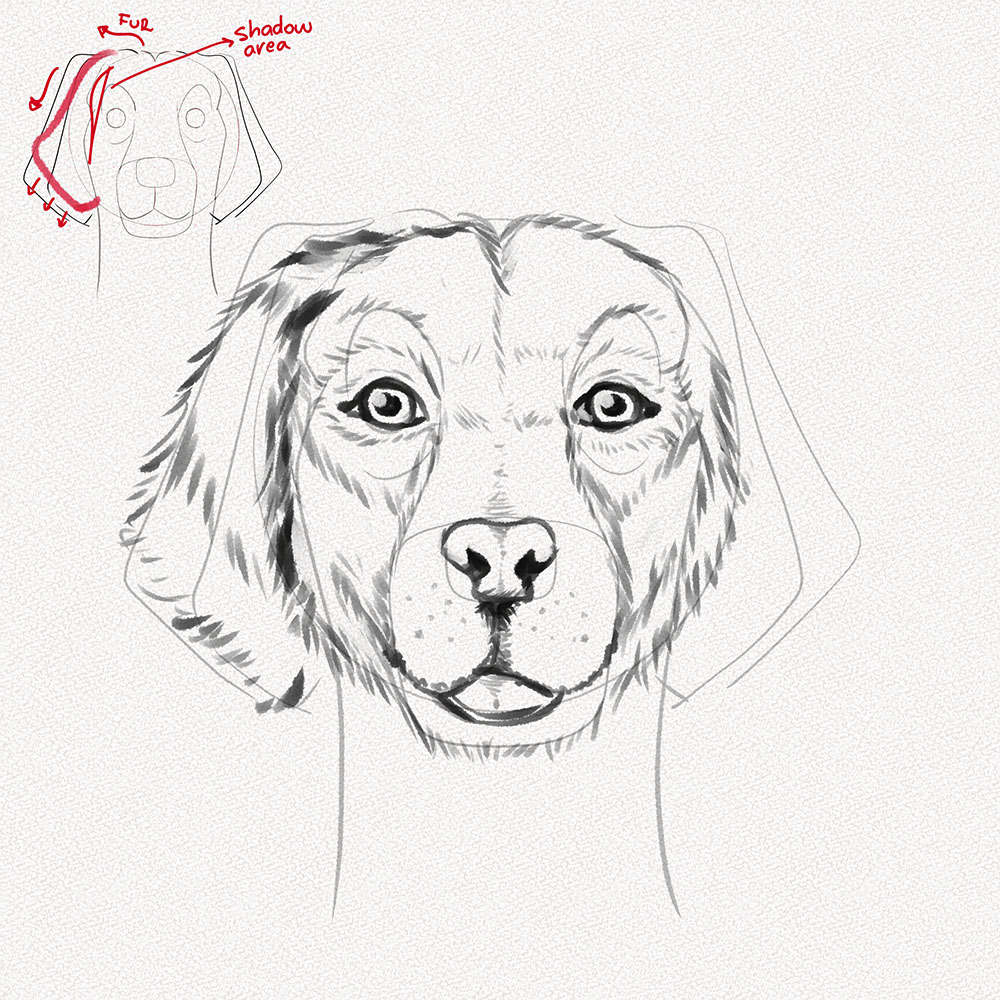
Using our dog as a reference, pull some traces in the directions indicated in the mini diagram, making sure to darken the area marked as "shadow area".
Step 24: Draw the Other Ear
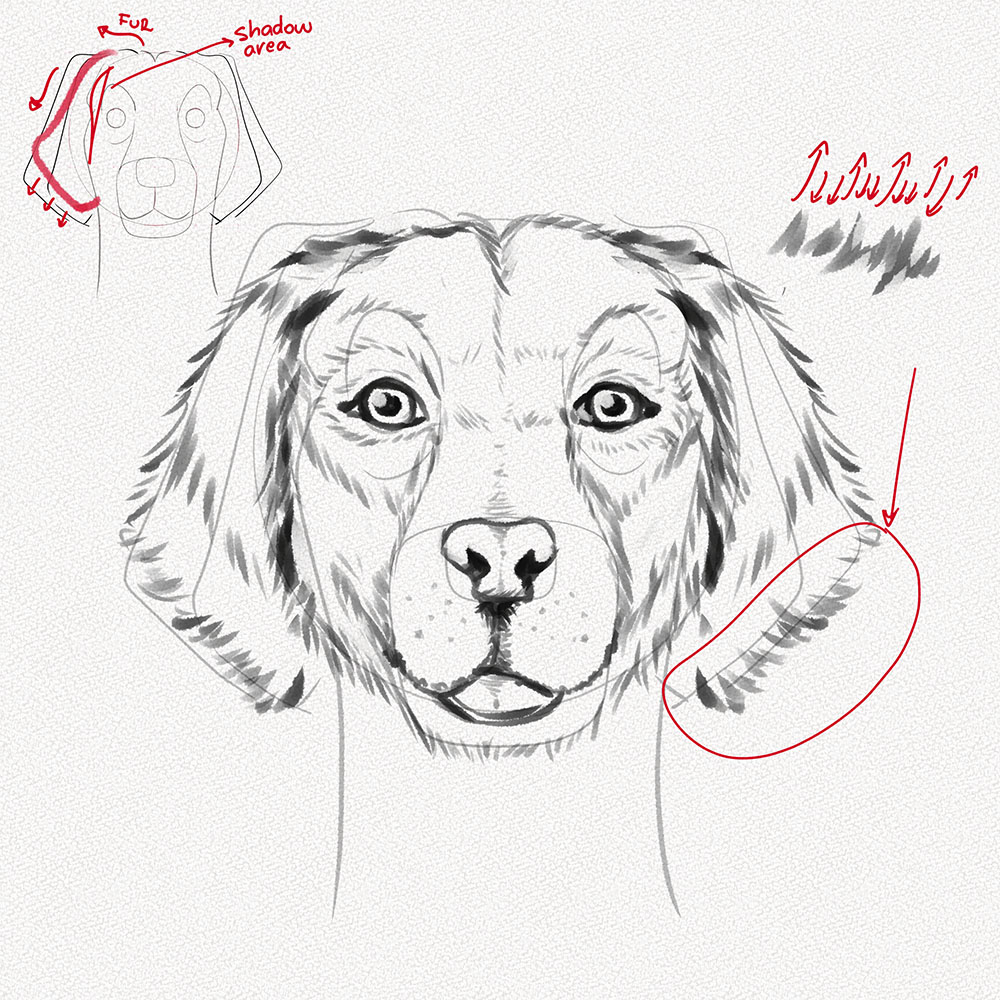
Now for the other ear so exactly the same, and if the fur traces are too complicated, follow the small guide of traces below, making sure to keep your hand loose and to do the traces in the indicated directions.
Keep in mind that these traces will help you with making the fur of the rest of the face.
Step 25: Draw the Neck
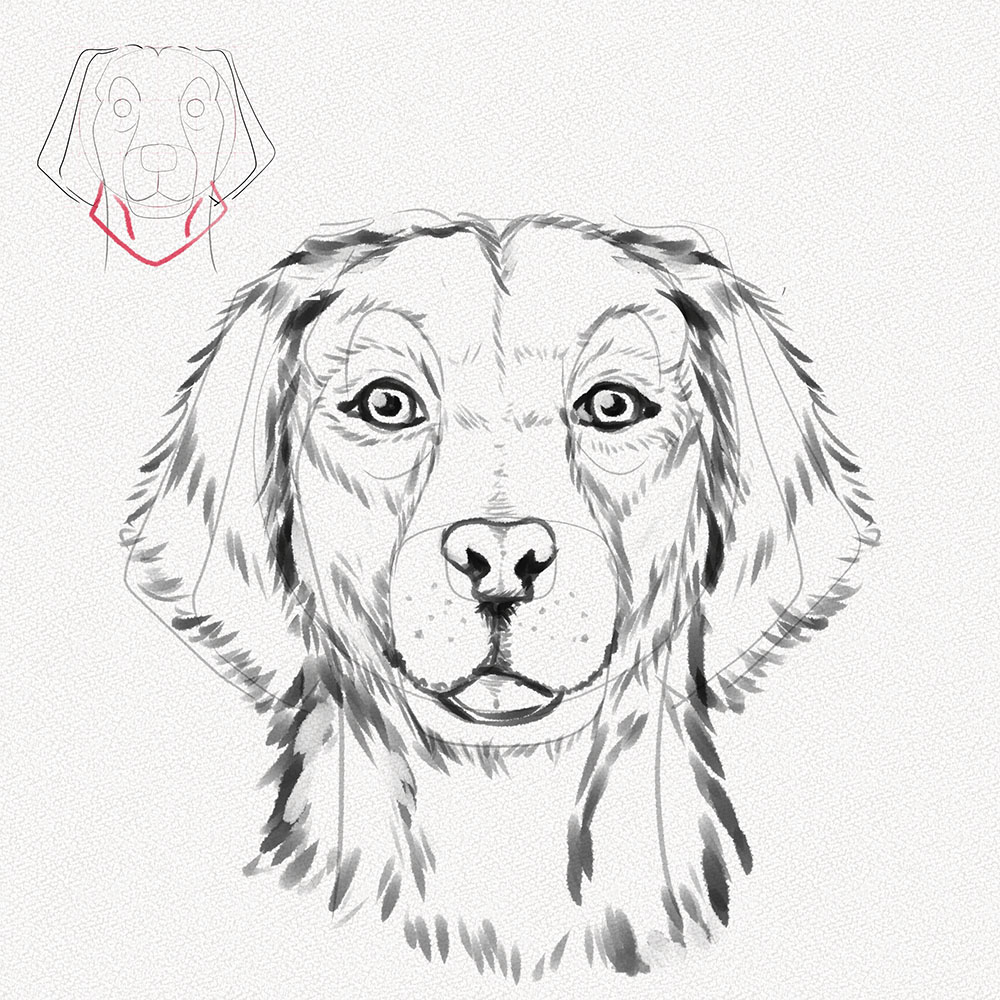
For this step, we're going to use our dog as a reference and draw his fur as we saw it, for a golden retriever, the neck extends to the sides, so draw the fur along the red lines in the mini diagram.
Step 26: Focused Shading
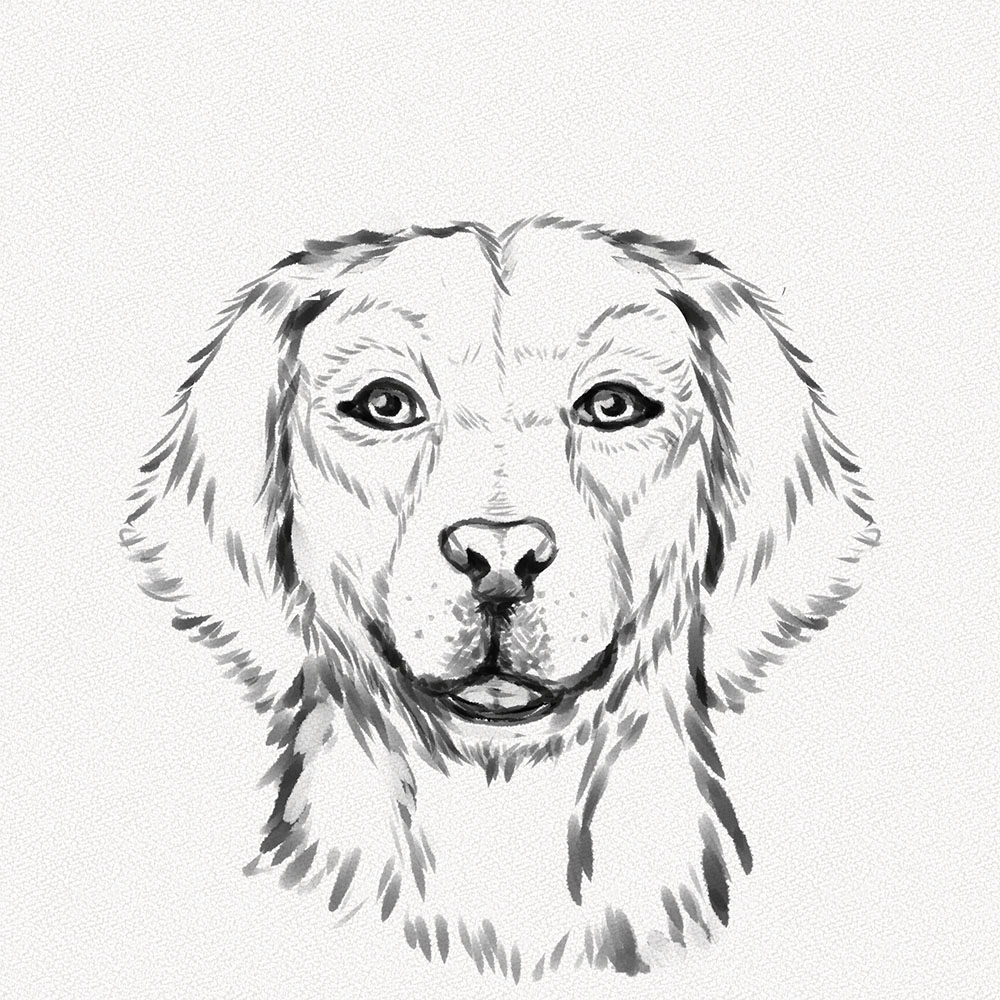
First, we're going to erase what's left of our guidelines and add some shadows to the eyes, nose, and upper mouth of our dog. These are small details that will make our dog's face much more realistic.
Since this dog has a bit of his tongue out, we're also going to shade darker the line under the tongue and the chin.
Step 27: Add the rest of the fur
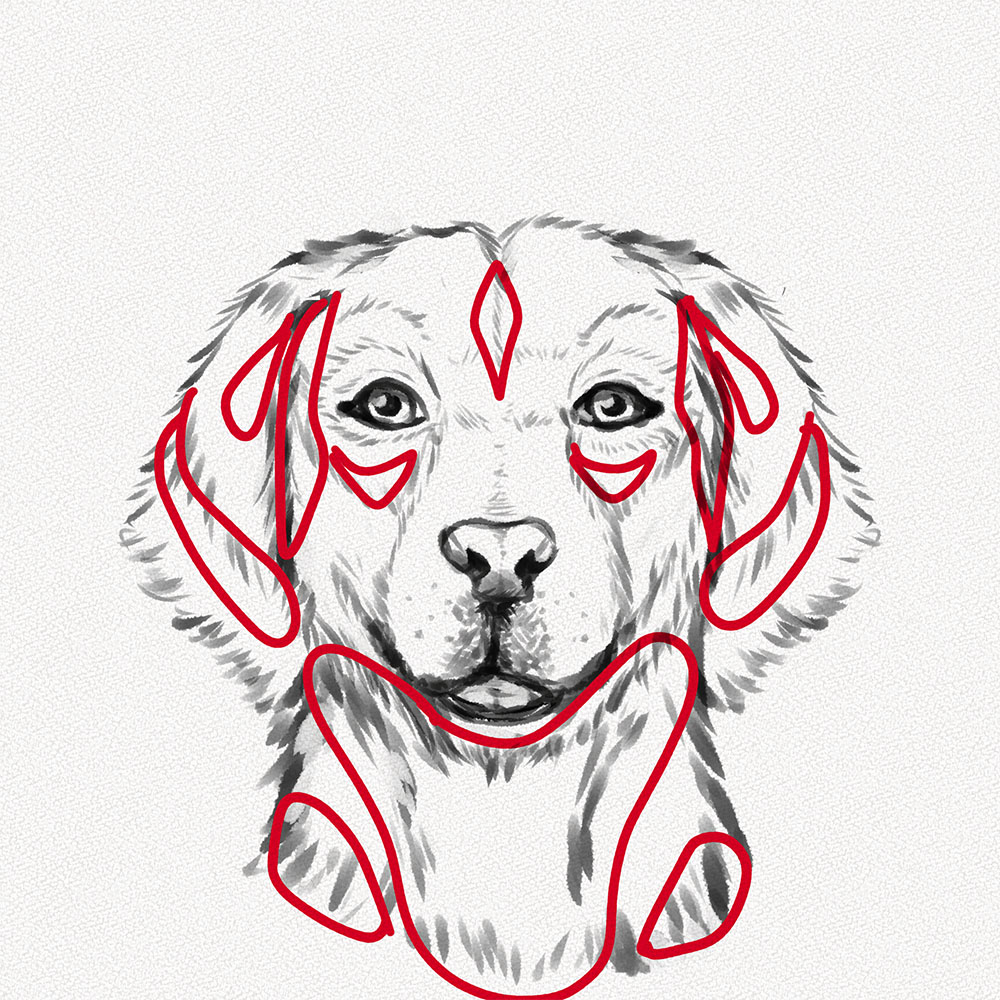
Now, check the areas marked in red and with the same soft traces we learned to make in step 4, fill in those areas.
Step 28: Blend, blend, and blend.
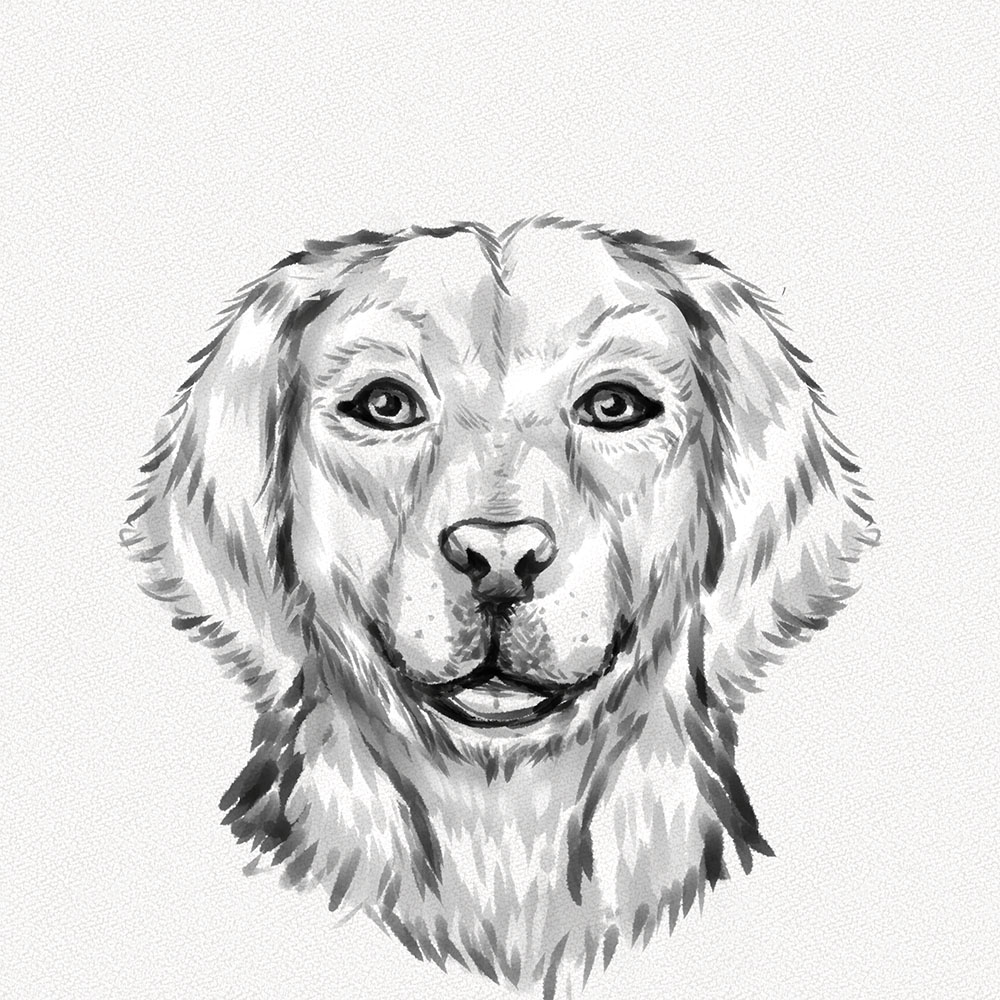
With the movement we learned to make in step 4, we're going to go over our graphite traces and blend with our blending tool, it should look something like this once you're over.
Step 29: Defining the Facial Fur
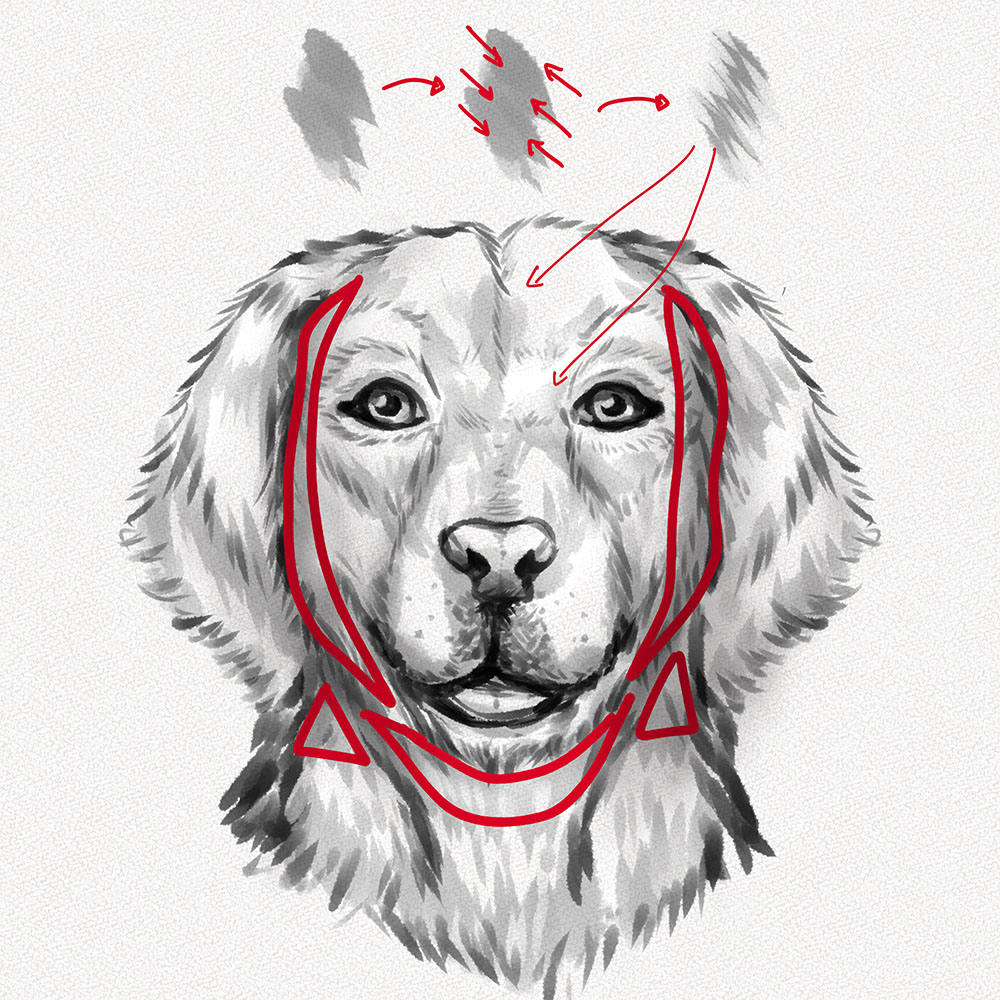
Now it for sure looks a bit more like a dog, we're not done though. With the tip of your eraser, we're going to take the spots we over blended and do as shown below, taking away graphite with soft traces to give the illusion of fur.
We're also going to add a bit more graphite traces in the red area, to give our dog's portrait more volume.
Step 30 – Final Step
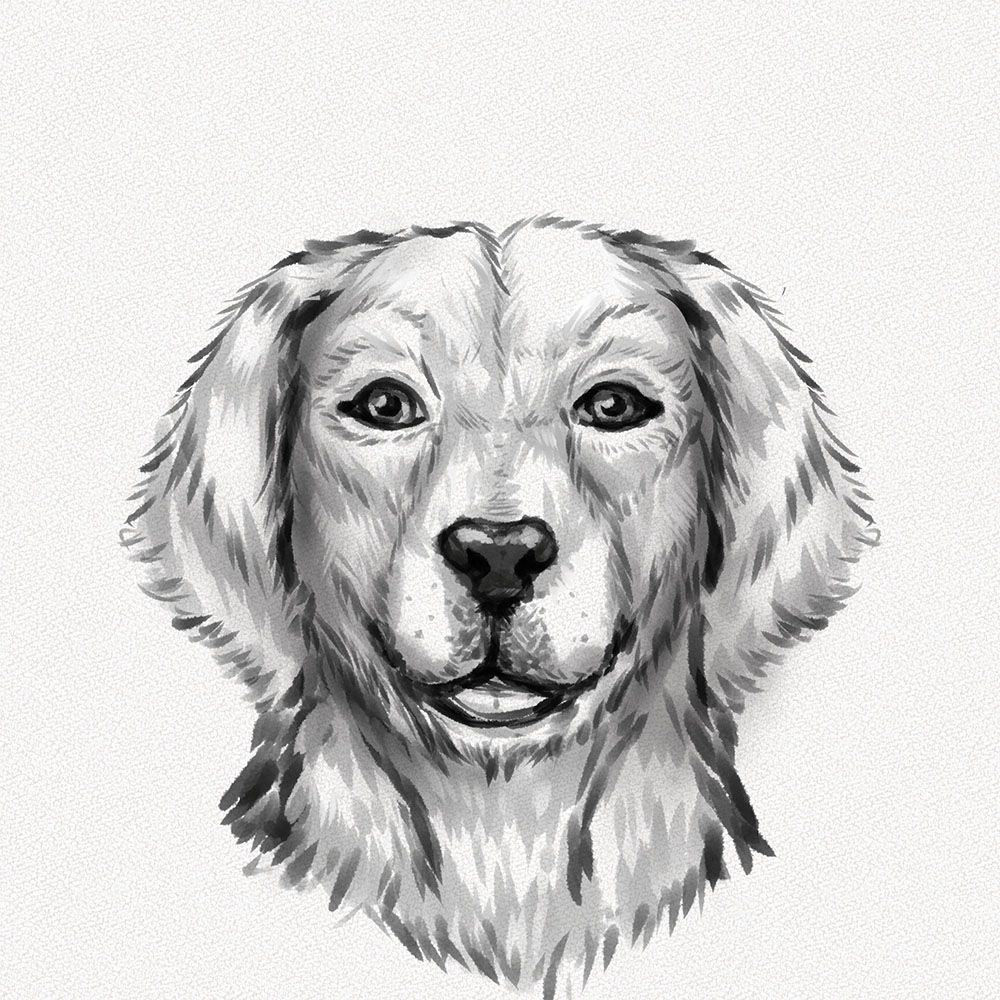
After we're done blending and correcting, we're going to fill in the nose, leaving some unfilled areas at the top for the highlights, and shade our eyes a tad bit more. And that's it! Congrats on totally nailing this!
Thank you for following this tutorial, I hope you had fun drawing this pal!
joneswhippercunch.blogspot.com
Source: https://www.artlex.com/art-tutorials/how-to-draw-a-dog-face/
0 Response to "Step by Step Easy How to Draw a Dogs Face"
Post a Comment